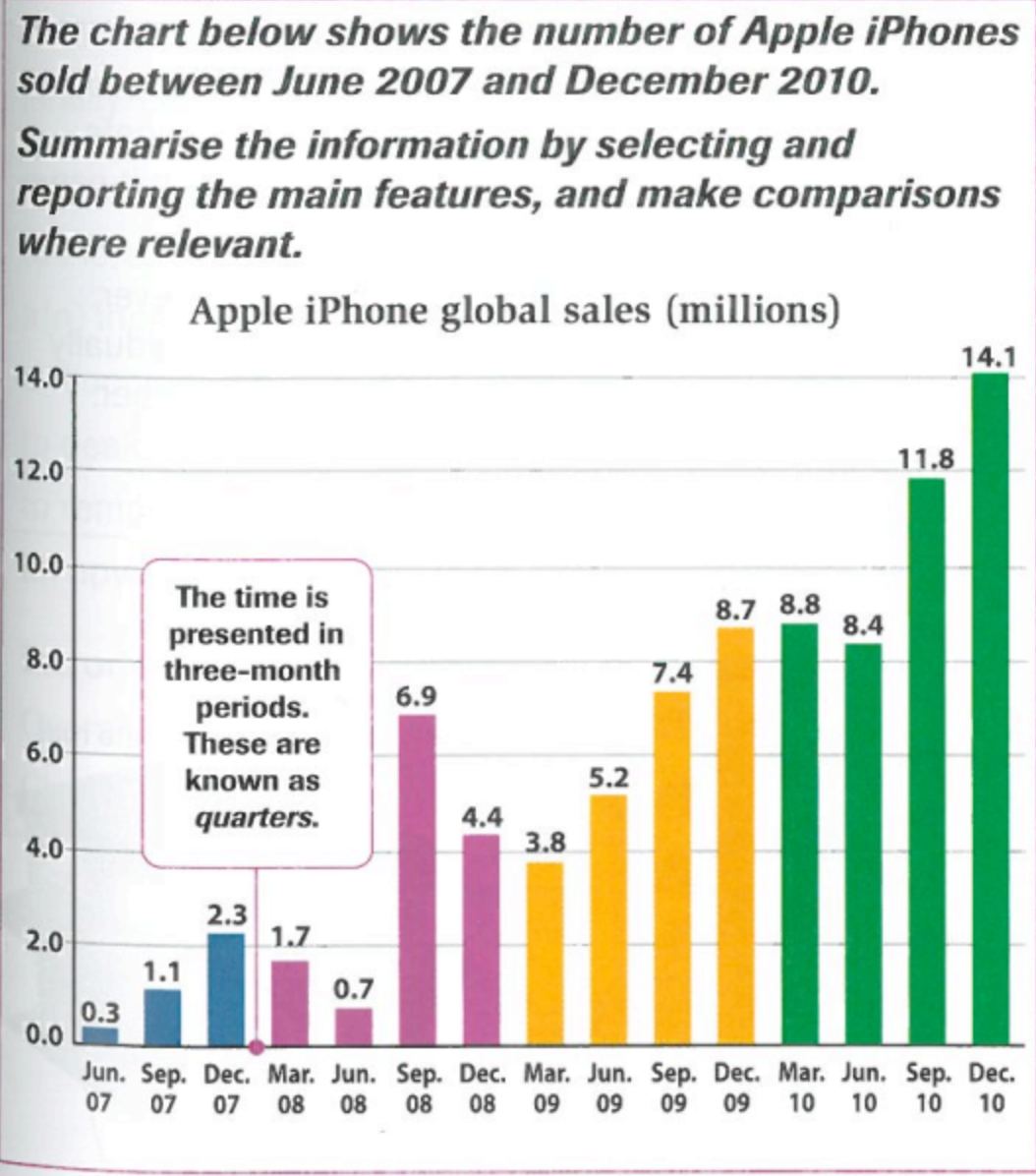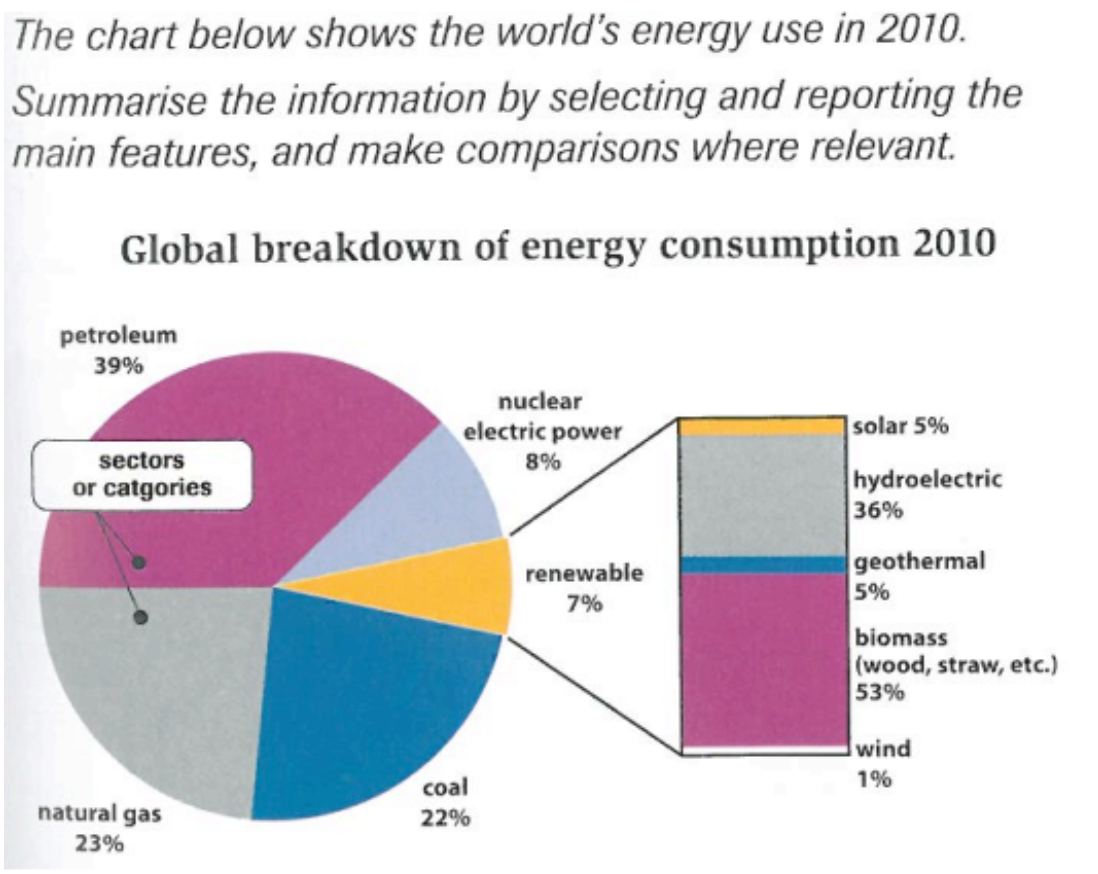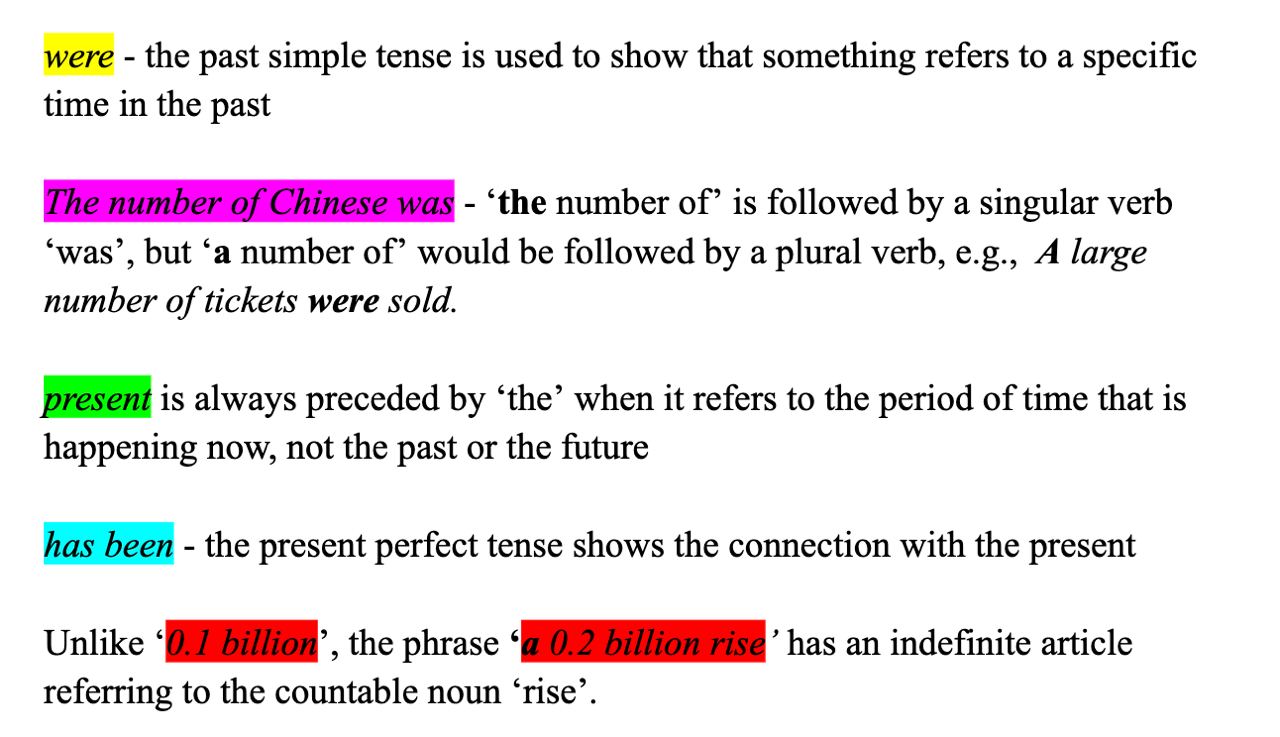
Mastering Time Management for IELTS Reading: A Step-by-Step Guide
- Reading
- IELTS
- Tips & Strategies

01.11.2024
In Writing Task 1 of the IELTS Academic test, a test taker must summarise and compare information from a bar or pie chart, line graph, table, diagram, map or a combination of these.
The work is assessed based on four criteria, each contributing a quarter of your grade:
Let’s examine some of the challenges a test taker might have when trying to meet each of these criteria.
This criterion measures whether the visual information in the task is accurately described and whether all parts of the task are covered.
It is recommended to spend 20 minutes on Writing Task 1.

Help your students score high in IELTS visuals
Join our courseYou must analyse the given data without expressing your attitude to it.
This criterion checks how well ideas are organised and connected.
It looks at the logical flow, paragraph structure, and use of linking words.
It is recommended to structure your response into the following four paragraphs:
Typically, the overview follows the introduction, but it can also be placed at the end of your report after the body paragraphs.
Each paragraph should have a clear central idea and be easy for a reader to follow.
Let’s illustrate this with an example of a bar graph.

Guy Brook-Hart and Vanessa Jakeman. Complete IELTS Bands 4-5, Cambridge University Press, 2012, p. 113.
| Paragraph | Main idea |
| Introduction | A paraphrased description of the graph that the task provides.
The graph gives information on the sale of iPhones around the world over a period of almost four years. Guy Brook-Hart and Vanessa Jakeman. Complete IELTS Bands 4-5, Cambridge University Press, 2012, p. 113. |
| Body paragraph 1 | Detailed information from June 2007 to September 2008
During this period, sales increased enormously, although there was some fluctuation. Between June 2007 and June 2008, the number of iPhones that were sold rose from 0.3 million to 2.3 million in December, but then fell back to 0.7 million. However, in the next quarter, sales increased by more than 6 million units and reached a peak of 6.9 million. Guy Brook-Hart and Vanessa Jakeman. Complete IELTS Bands 4-5, Cambridge University Press, 2012, p. 113. |
| Body paragraph 2 | Detailed information from September 2008 to December 2010
After September 2008, there was another drop in sales to 3.8 million, but then in June 2009, they began to rise again and the figures show a considerable increase, to 8.8 million in March 2010. This was followed by a very slight decrease in June 2010 and then another big increase over the next two quarters, to 14.1 million in December 2010. Guy Brook-Hart and Vanessa Jakeman. Complete IELTS Bands 4-5, Cambridge University Press, 2012, p. 113. |
| Overview | Includes all the key features of the graph
Clearly, there has been an upward trend in global sales figures over the period, and the most significant growth was in 2008. Guy Brook-Hart and Vanessa Jakeman. Complete IELTS Bands 4-5, Cambridge University Press, 2012, p. 113. |
What challenges do students face in IELTS Reading section?
While linking words (e.g., Firstly, Nonetheless, Additionally) help show relationships between paragraphs and sentences, it isn’t necessary to start every sentence with them.
We can use referencing devices to refer to things mentioned earlier and in this way avoid repeating the same words.
Example
Engineering attracted the largest number of students, while medicine was also a major field of interest. The former saw a 35% enrollment rate, compared to 30% for the latter.
Based on content generated by ChatGPT (OpenAI), with modifications.
the former = engineering
the latter = medicine
The criterion checks how well a student uses appropriate words and phrases to describe visual information clearly and effectively.
The writing task must be written formally.
Compare:
Formal: Many first-degree holders did not secure employment.
Informal: A lot of people with bachelor's degrees didn’t get jobs.

What should your learners know about IELTS Reading?
Find outIt’s essential to master the relevant vocabulary for describing visuals.
Example of describing a trend:
Overall, the number fell from a high of 170,000 to almost zero. However, there were significant fluctuations in the trend. For example, just after 1940, there was a significant surge in the number of cases from 50,000 to approximately 170,000.
Guy Brook-Hart and Vanessa Jakeman. Complete IELTS Bands 6.5-7.5, Cambridge University Press, 2013, p. 104.
Do not copy the wording of the task in your introduction.
Instead, paraphrase it.
Otherwise, you will lose marks.
Example:

Guy Brook-Hart and Vanessa Jakeman. IELTS Bands 5-6.5, Cambridge University Press, 2012, p. 93.
Let’s look at the paraphrased task in the introduction.

Guy Brook-Hart and Vanessa Jakeman. IELTS Bands 5-6.5, Cambridge University Press, 2012, p. 93.
Some words can’t be paraphrased, such as chart or 2010.
This criterion assesses the variety and correctness of grammatical structures used by test takers.
Let’s analyse some of the grammar in the extract below.

Guy Brook-Hart and Vanessa Jakeman. Complete IELTS Bands 5-6.5, Cambridge University Press, 2012, p. 93.


Common mistakes students make in the IELTS Listening section
Read moreTo enhance accuracy, consider rewriting sample reports and creating your own, using spell check in word processing programs to identify errors and revising until no errors remain.
According to IELTS IDP, test takers often make errors with words that require doubled consonants, such as parallel, occurrence, and dropped.
Some commonly confused words include:
Use commas:
1. To separate hundreds, thousands and millions
1, 750, 484
2. To separate items on a list, except for the last item separated with ‘and’
In 2020, the company saw growth in sales revenue, market share and customer satisfaction.
3. When we put more than one adjective before a noun
The data reveals a significant increase in the number of urban, highly-educated professionals.
4. With non-defining relative clauses (parts of sentences which give extra information)
The graph shows the annual revenue of the company, which experienced a sharp increase in 2022, and provides a clear picture of its financial growth over the years.
10 cool tips from CELTA tutors
5. Before a clause that starts with ‘which’, comes at the end of the sentence and refers to the whole sentence
The chart illustrates the distribution of household incomes in various regions, which highlights significant disparities between urban and rural areas.
6. With adverbs
The survey results indicate a decline in urban pollution. However, rural areas have seen a steady increase.
The survey results indicate a decline in urban pollution; however, rural areas have seen a steady increase.
The survey results indicate a decline in urban pollution. Rural areas have seen a steady increase, however.
7. Before coordinating conjunctions, aka FANBOYS (for, and, nor, but, or, yet, so), when they join two sentences
The number of international students increased significantly in 2020, and the data clearly indicate that scholarship programs have improved.
But
The number of domestic and international students increased.

Practice in the same format
Write your tasks on paper if you’re taking a paper-based test, or use a computer if computer-based.
Pay attention to the word count
Note the volume of the handwritten text it takes to meet the word count criteria (at least 150 words).
Use the word count feature to keep track of the number of words typed on a computer.
At the actual test, the programme in the computer-based version will display the number of words you've typed.
Time yourself
Recreate the test conditions by completing the report in 20 minutes and all parts of the test within 2 hours and 45 minutes.
Yuliia Ivanii
Author
Teacher of General English, Young Learners, Exam Prep
Comments
Leave your comment